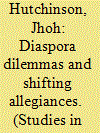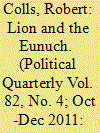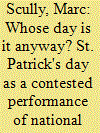|
|
|
Sort Order |
|
|
|
Items / Page
|
|
|
|
|
|
|
| Srl | Item |
| 1 |
ID:
096842


|
|
|
|
|
| Publication |
2010.
|
| Summary/Abstract |
Focused on the London Irish, this article discusses the diasporic dilemmas of Irish Catholics in England who oscillated between four claims to loyalty in the early twentieth century. Liberals and later the labour movement sought to mobilise them for radical political and socialist goals; the Catholic Church to support religious education against secularist threats; a homeland nationalism to advance the prospects of Irish parliamentary autonomy; and a diasporic nationalism to defend their ethnic interests in England. These pressures peaked during the First World War and the Irish War of Independence. The overall effect of this nationalist mobilisation may have been to advance their integration into English social and political institutions.
|
|
|
|
|
|
|
|
|
|
|
|
|
|
|
|
| 2 |
ID:
148120


|
|
|
|
|
| Summary/Abstract |
The negotiations that led to the formation of the Irish Free State in 1921 form the focus of this article. A longstanding interpretation of these negotiations has the British finessing the Irish by playing on the weaknesses of character of the Irish delegation. This interpretation is both flawed and influential. On one level, the article questions its historical accuracy and proposes an alternative. On another level, the article seeks to account for its enduring importance. This interpretation plays a role in a larger narrative of Anglo-Irish relations that is rooted in British colonialism and Irish nationalism.
|
|
|
|
|
|
|
|
|
|
|
|
|
|
|
|
| 3 |
ID:
108315


|
|
|
|
|
| Publication |
2011.
|
| Summary/Abstract |
The Lion and the Eunuch challenges the failures of British politicians to adequately understand the complexities, and the subtleties, of British national identity, and goes on to define it for them. It also explains reasons for our current confusions over who we are in the world. In 1940 Orwell wrote The Lion and the Unicorn as a rallying cry for a richly identifying country that was still able to imagine itself, and re-imagine itself, as the need arose. This essay suggests that without a radical change of government policy and thought, that power will continue to decline with far reaching consequences for the peoples of these islands.
|
|
|
|
|
|
|
|
|
|
|
|
|
|
|
|
| 4 |
ID:
099302


|
|
|
|
|
| Publication |
2010.
|
| Summary/Abstract |
For the first time in American history, the 2000 United States census allowed individuals to choose more than one race. That new policy sets up our exploration of whether and how multiracialism is entering Americans' understanding and practice of race. By analyzing briefly earlier cases of racial construction, we uncover three factors important to understanding if and how intensely a feedback effect for racial classification will be generated. Using this framework, we find that multiracialism has been institutionalized in the federal government, and is moving toward institutionalization in the private sector and other governmental units. In addition, the small proportion of Americans who now define themselves as multiracial is growing absolutely and relatively, and evidence suggests a continued rise. Increasing multiracial identification is made more likely by racial mixture's growing prominence in American society-demographically, culturally, economically, and psychologically. However, the politics side of the feedback loop is complicated by the fact that identification is not identity. Traditional racial or ethnic loyalties and understandings remain strong, including among potential multiracial identifiers. Therefore, if mixed-race identification is to evolve into a multiracial identity, it may not be at the expense of existing group consciousness. Instead, we expect mixed-race identity to be contextual, fluid, and additive, so that it can be layered onto rather than substituted for traditional monoracial commitments. If the multiracial movement successfully challenges the longstanding understanding and practice of "one drop of blood" racial groups, it has the potential to change much of the politics and policy of American race relations.
|
|
|
|
|
|
|
|
|
|
|
|
|
|
|
|
| 5 |
ID:
113023


|
|
|
|
|
| Publication |
2012.
|
| Summary/Abstract |
One of the more intriguing aspects of St. Patrick's Day celebrations as a nationalised ritual of a performed Irishness, both within and outside Ireland, is the extent to which it represents a dialogue between territorialised and diasporic expressions of Irish identity, and claims of belonging to Irishness. St. Patrick's Day celebrations in English cities are a particularly intriguing example of this contestation, due to the proximity of the two countries and the historical structural and cultural constraints on the public performance of Irish identity in England, as well as their more recent reinvention within celebratory multiculturalism. This article examines how debates around the authenticity of St. Patrick's Day parades in English cities are employed in the identity work of individual Irish people. In doing so, it provides insight on the tensions between Irishness as transnational, diasporic, and ethnic, as experienced in England.
|
|
|
|
|
|
|
|
|
|
|
|
|
|
|
|
|
|
|
|
|